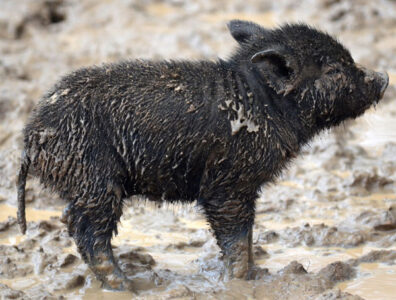A press release fromThe American Livestock Breeds Conservancy.
“One of America’s most historic breeds of swine – the Choctaw hog – is on the verge of extinction,” said Eric Hallman, Executive Director of the American Livestock Breeds Conservancy (ALBC), a national nonprofit dedicated to saving endangered breeds of livestock. “Our technical staff have just returned from Oklahoma and found that there are only around 100 Choctaw hogs left.” Choctaw hogs have a storied past, providing sustenance to the Choctaw Indians as they faced an uncertain future on the Trail of Tears, and food for Oklahomans during the Great Depression. But due to several factors including modern farming trends, extreme weather, and changes in the economy, the Choctaw hog is now clinging to survival.
These new population estimates designate the Choctaw hog as what is likely the most endangered breed of swine, and one of the most endangered animals on the planet. Only a few farmers in southeastern Oklahoma raise the entire breed’s population, which makes the breed’s status even more perilous. “When all of the animals in a particular breed are located in one geographic location, the threat of extinction increases dramatically because a single catastrophic event could wipe out the entire population,” said ALBC’s Technical Programs Director Dr. Alison Martin.
As one of the last domesticated breeds of swine that are free ranging, Choctaw hogs are genetically special, and important to conserve. According to world renowned expert in rare livestock breeds Dr. Phil Sponenberg, Choctaw hogs are “smart, hardy, and agile,” and are “remarkably self-sufficient in mothering and foraging in the rangelands of Oklahoma.” According to Martin, “A loss of this breed would be a significant blow to biodiversity in agriculture.” Modern agricultural practices tend to focus on the use of a few highly specialized breeds selected for maximum output in a controlled environment. Many traditional, or “heritage” livestock breeds such as the Choctaw hog have lost popularity and are now threatened with extinction.
The down economy in recent years has also contributed to the Choctaw hog’s demise. Because heritage breeds grow more slowly than industrial breeds do, they tend to sell for a higher price. As more consumers lean toward purchasing cheaper foods, the demand for meats from heritage breeds has fallen and farmers are not breeding as many animals, adding to the challenges for endangered breeds. Choctaw hogs still have a role in agriculture, however. Because of their small size and excellent foraging capabilities, they make an ideal animal to raise on small family farms. In addition, chefs around the world have taken note of the exceptional flavor of heritage breeds and are incorporating them into their menus.
ALBC is quickly putting together an initiative with plans to start a conservation breeding herd to increase the Choctaw hog’s numbers. “Currently, we are in need of funds to purchase fencing, feed, and other items for the conservation herd,” said Martin. “After the population becomes more stable, breeding stock will start to become available to the public. We have had success with similar projects in the past – a number of breeds, including Randall Lineback cattle, San Clemente goats, and Santa Cruz sheep have been rescued from similar circumstances by ALBC. We hope to do the same for the Choctaw hog.”
For more information on the Choctaw hog and to contribute to the conservation program, visit the American Livestock Breeds Conservancy’s website at www.albc-usa.org. Donations can also be sent to ALBC, PO Box 477, Pittsboro, NC 27312.
About the American Livestock Breeds Conservancy (ALBC):
The American Livestock Breeds Conservancy is a national nonprofit organization working to save nearly 200 breeds of livestock and poultry from extinction. ALBC’s mission is to strengthen the future of agriculture through genetic conservation and the promotion of endangered breeds of livestock and poultry.




